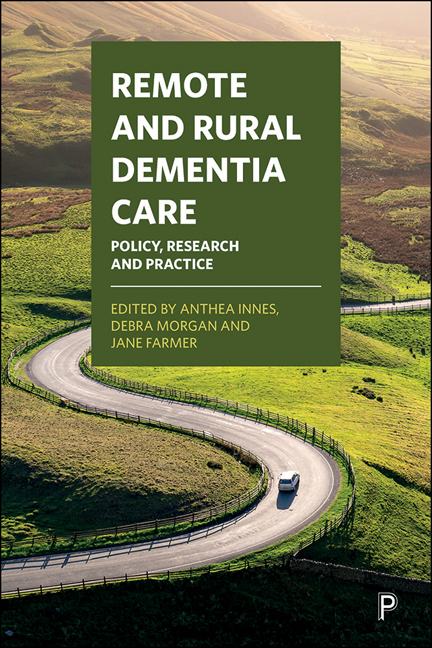6 - Timely Diagnosis of Dementia in Rural Areas in Austria: The Dementia Service Centre Model
Published online by Cambridge University Press: 10 March 2021
Summary
Introduction
Seventy-eight per cent of the 8.7 million Austrians live in rural areas with limited or reduced access to specialised medical and psychosocial support services as compared with urban areas. With respect to dementia, Alzheimer Europe has estimated that approximately 145,431 people were living with dementia in Austria in 2013 (Alzheimer Europe, 2013) and according to Alzheimer's Disease International (ADI, 2015) it is estimated that the number of affected people will double every 20 years worldwide. Care cost attributed to dementia in Austria is estimated to be about $5 billion per year and will rise to $9 billion per year by 2050 (Gleichweit and Rossa, 2009). The economic strain placed on the healthcare systems by these high numbers is in large part caused by the high institutionalisation rates associated with dementia (ADI, 2015). Studies suggest that early diagnosis (Koch and Iliffe, 2010) and psychosocial interventions (Olazaran et al, 2010; Logsdon et al, 2007) for people with dementia and their caregivers could not only help to improve the quality of life of people with dementia, but also delay institutionalisation (Mittelman et al, 1996). Therefore, early or timely diagnosis could reduce the financial burden on the healthcare system.
Approximately 20 to 30 per cent of affected people in Austria receive a medical diagnosis during their illness. The highest diagnosis rate was found in the main cities (Gleichweit and Rossa, 2009). This diagnosis rate is comparable to that of other European countries (Barth et al, 2018). Interestingly, the Organisation for Economic Co-operation and Development (OECD, 2018) points out that only 40 per cent of OECD countries can provide information on their detection rate and that under-detection of dementia is high globally (Lang et al, 2017). Consequently, studies in different international environments have investigated hurdles to early detection of dementia. The overriding hurdle of low diagnosis rates in urban and rural environments is the general stigma of dementia within societies and stigmatisation by healthcare professionals (Vernooij-Dassen et al, 2005; Morgan et al, 2014). Rural areas in addition are even more difficult to serve. Here, problems are compounded by a shortage of professionals and the difficulty of reaching services due to transportation cost and distance (Szymczynska, et al, 2011).
- Type
- Chapter
- Information
- Remote and Rural Dementia CarePolicy, Research and Practice, pp. 103 - 126Publisher: Bristol University PressPrint publication year: 2020

